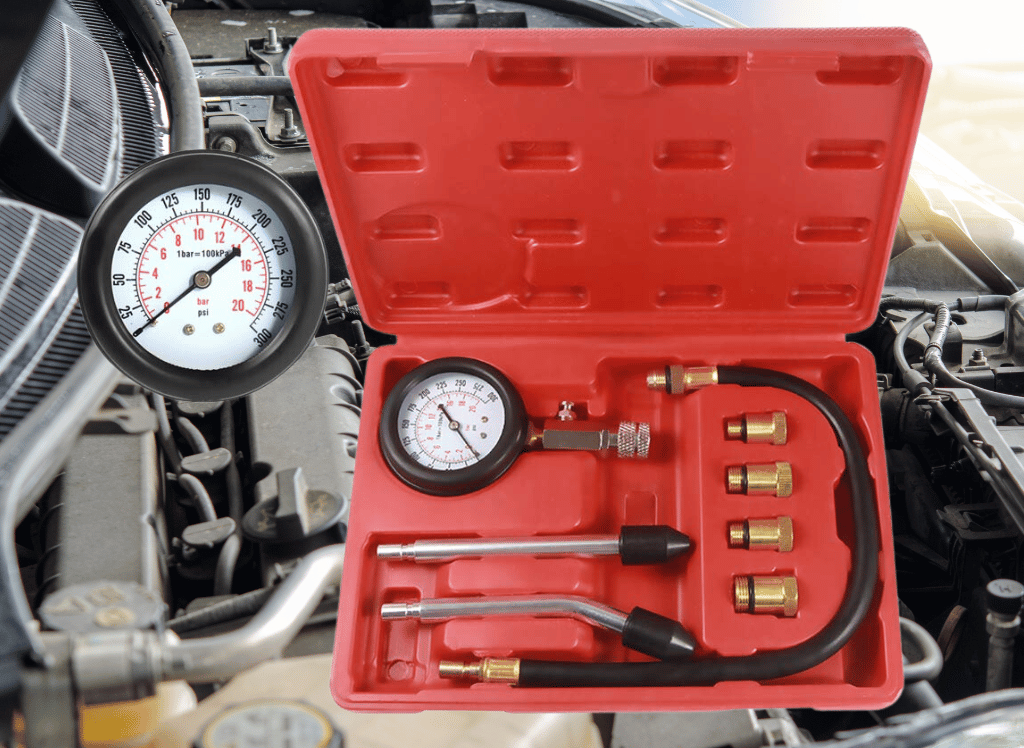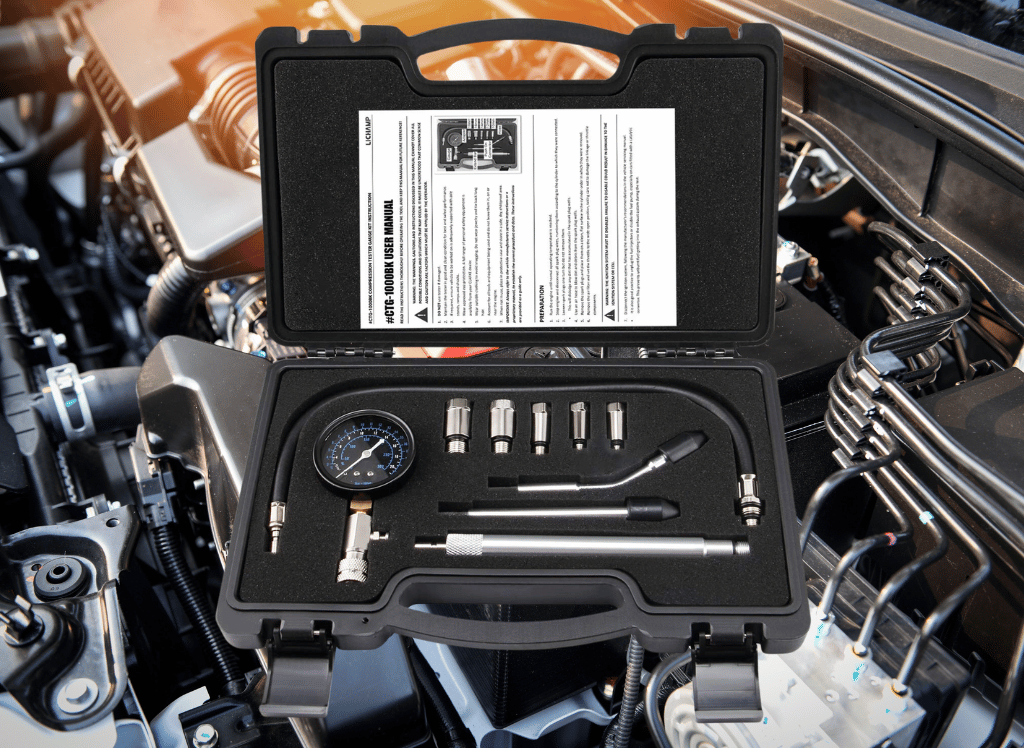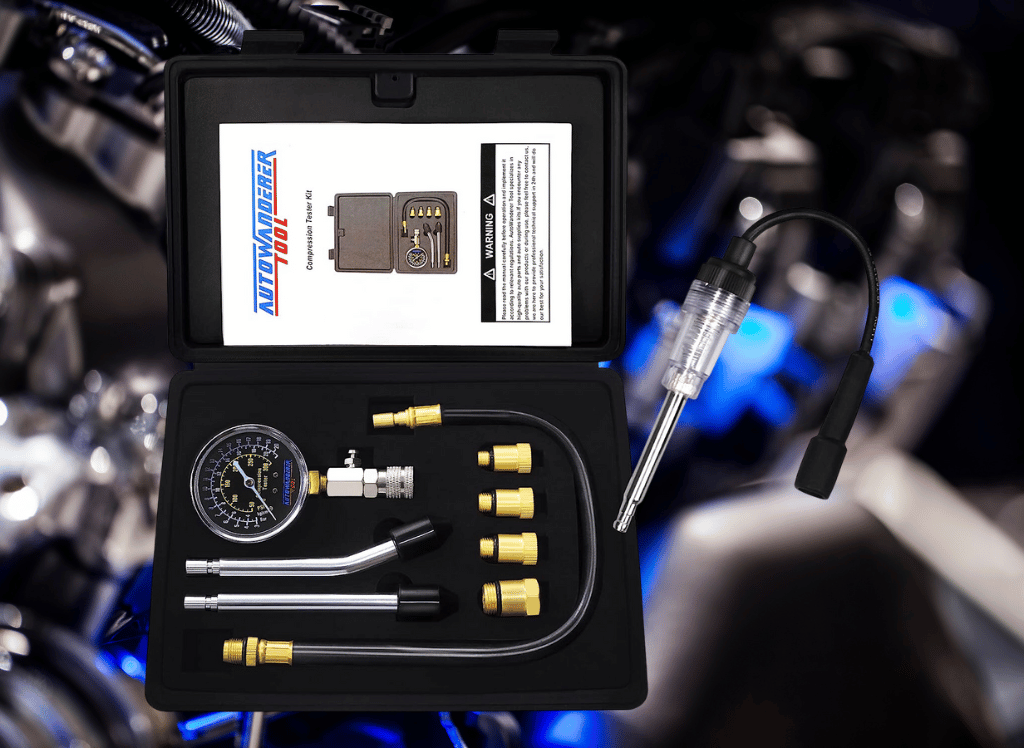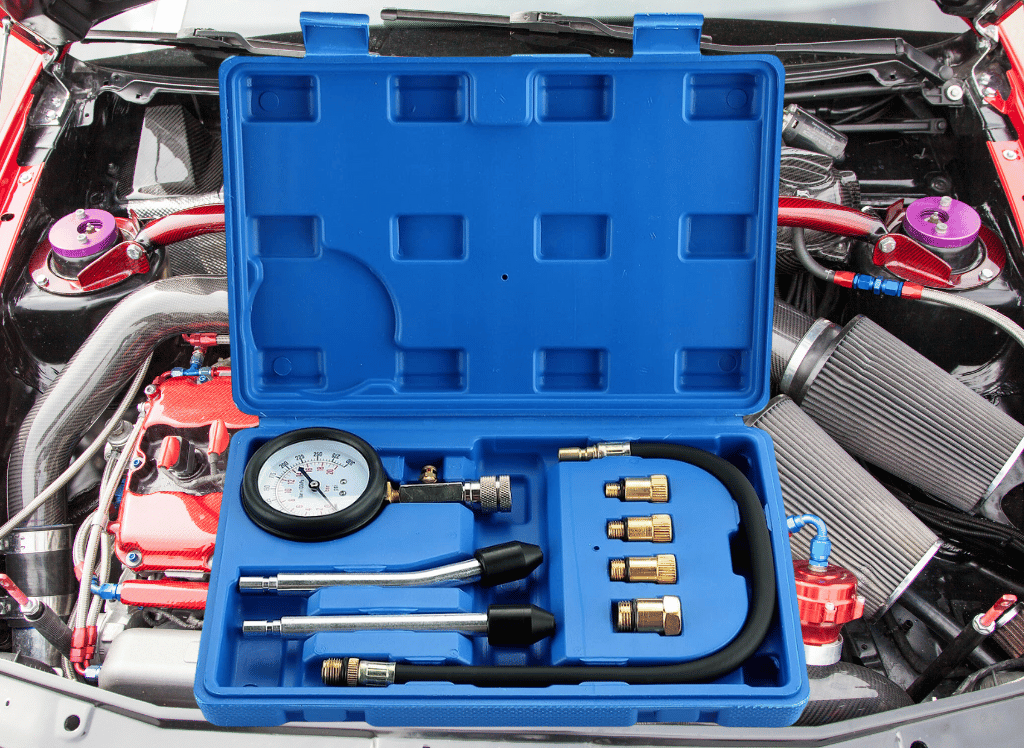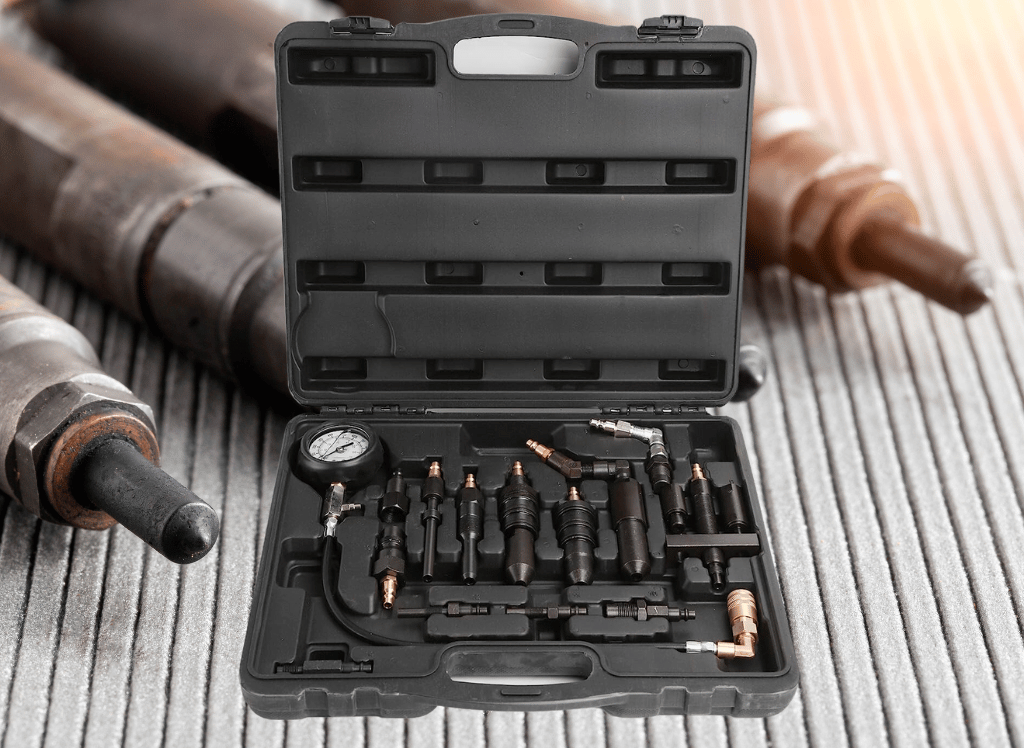Best Compression Gauge: A Product Review
If you're looking for a reliable way to measure your compression, then you need to check out our list of the best compression gauges!
Engine compression testers are essential tools for anyone who works on engines. They allow you to test the engine's piston rings, valves, and other components to ensure they are in good working order.
Most compression testers come in kit form, with all the necessary hoses, fittings, and adapters to attach the tester to the engine. Most kits have adaptors that will allow you to test any size engine. Once your tester is assembled, please attach it to the engine and start.
The tester will measure the pressure exerted by the engine's piston rings and provide a reading on a gauge. If the reading is low, it may be an indication that the piston rings are worn or damaged. Compression testing is a quick and easy way to diagnose engine problems and keep your engine running smoothly.
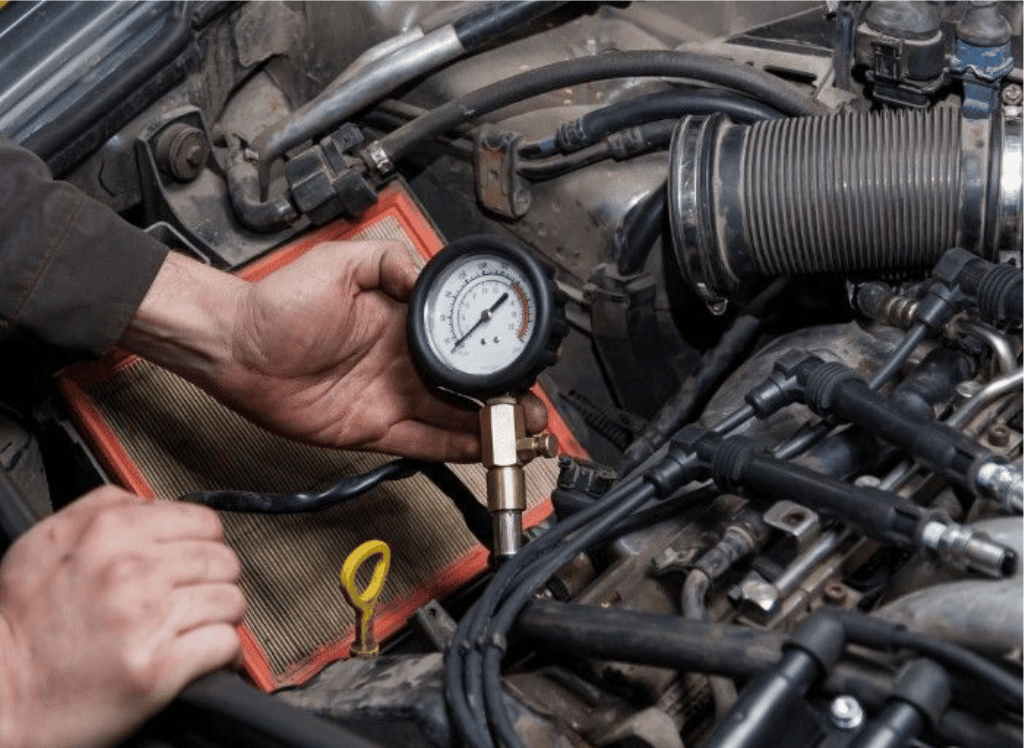
How We at Mechanicaddicts Choose the Best Compression Gauge
Before choosing a compression tester, there are many factors that you need to take into account, such as accuracy, range, dial size, and price. Accuracy is one of the most important factors when purchasing a compression tester. If you want an accurate reading, purchase a digital compression tester.
Digital compression testers use sensors to measure pressure and can be more accurate than analog gauges. However, they are usually more expensive. Another factor to consider is the range of the gauge. You will need a gauge with a specific range depending on the pressure you measure.
What We Like About This Compression Tester
If you're looking for a reliable and accurate way to test engine compression, the BETOOLL HW0130 8pcs Petrol Engine Cylinder Compression Tester is a great choice. This easy-to-use tester has clear instructions and everything you need to test cylinders on most petrol engines.
The tester features a double-scale gauge that goes up to 20 bar (300psi), making it perfect for diagnosing potential problems with your engine. The gauge is housed in a lightweight, durable resin case with a rubber cover for outstanding shock absorption performance.
The case also has a built-in handle for easy portability. Whether you're a professional mechanic or a passionate do-it-yourselfer, the BETOOLL HW0130 8pcs Petrol Engine Cylinder Compression Tester is essential for maintaining your engine.
What You Should Know About This Product
This product is excellent for checking compression on petrol engines quickly and accurately. It has adapters for most applications, and the easy pressure release button on the tester's side is very convenient.
The 3" gauge features a dual-color scale, which makes it easy to read. The completed kit also includes two rubber cone ends, which do not need to thread into the head, making it even easier to use. Overall, this is a great product that will make your life easier.
What We Like About This Compression Tester
A reliable engine tester gauge kit ensures your car's quality. The 10-in-1 engine tester gauge kit includes a 1-piece spring buckle gauge; 5-piece brass adapters M10, M12, M14, M16, and M18 for wide applications; 2-piece straight and angled connector for direct testing; extra long 8 inches extension tube and 16 inches extension hose for extended reach testing.
This allows you to have a variety of options when it comes to testing your car's engine. The Max 300PSI or 20BAR dual pressure units with easy to read colored and large dials, an acrylic glass gauge cover with anti-scratch coating, and a metal protective cover for outstanding shock-absorption performance.
A Built-in check valve with a pressure-maintaining function. Ensure the gauge gets max pressure at the spark plug holes during compression. These features make this kit a reliable choice for those who want to maintain the quality of their car.
What You Should Know About This Product
A compression tester is vital for any mechanic as it can quickly and accurately identify engine issues. Compression testers measure the pressure in an engine's cylinders and then compare that reading to the engine's normal operating pressures. If the readings are significantly lower than expected, it can indicate problems such as sticking valves, carbon build-up, or cracked cylinder heads.
In addition, compression testers can also be used to check for worn piston rings or damaged pistons. While compression testers are most commonly used on gasoline engines, they can also be used on other engines, such as diesel engines. A compression tester is essential for diagnosing engine problems regardless of the tested engine.
What We Like About This Compression Tester
This engine testing tools kit includes a pressure gauge, spark plug tester, push-on connectors, extension hose, adapters, and a blow molding case. It is an essential tool for any car or motorcycle owner as it provides an easy way to test the cylinder pressure. The pressure gauge has a max range of 300PSI, making it ideal for testing gas and diesel engines
The spark plug tester ensures that the spark plugs are firing correctly, while the extension hose and adapters allow for easy connection to any engine. This complete testing kit comes in a handy blow molding case with foam, making it easy to store and transport. This comprehensive toolkit lets you quickly and easily test your engine's performance.
What You Should Know About This Product
Checking your engine's compression is essential to ensure it is running correctly. The AutoWanderer Tool 9Pcs Engine Compression Tester is a great way to do this. It is made of durable steel and brass components to last a long time.
It also has a pressure gauge and various adapters so that you can use it on different engines. This spark plug tester is a must-have diagnostic tool for any engine with a spark plug. It can quickly and efficiently diagnose ignition/spark problems.
Bring this professional AutoWanderer Tool 9Pcs Engine Compression Tester Kit. You will be able to solve the problem of low compression in the cylinders by yourself. This kit comes with 1 Cylinder Pressure Gauge, four adapters of standard and specialty, two rubber cone ends, a 16.5" flex hose gauge assembly with a quick coupler, and one user manual, all firmly stored in the case. 1 Spark Plug Tester is outside the mold case.
It is suitable for most types and depth spark plugs of the gasoline engine cylinder, commonly used in motorcycles, cars, trucks, ATVs, and other types of 2 or 4 strokes. This affordable and practical kit is an excellent choice for you. Don't hesitate to get one!
What We Like About This Compression Gauge
The DASBET Petrol Gas Engine Cylinder Compression Tester is a must-have tool for any do-it-yourselfer or professional mechanic. This cylinder pressure gauge is used to check the size of the gas pressure in the cylinder, making it quick and easy to set to your motor or car.
The convenient plastic case ensures that all components are securely stored when not in use. The four metal adapters allow you to use the compression tester with various engines. Whether diagnosing and repairing problems in your garage or at a professional shop, the DASBET Petrol Gas Engine Cylinder Compression Tester will help you get the job done right.
What You Should Know About This Product
The DASBET Petrol Gas Engine Cylinder Compression Tester is a quick and easy way to check the compression of your petrol engine. The compact design and easy-to-read gauge make it an ideal tool for the mechanically minded. The kit includes a pressure gauge, four different thread sizes, and a hose with a pressure tube.
The pressure gauge has two test pressure settings: 0 - 300 PSI / 0 - 21 kg / CM². The overall length of the hose is 430mm, and the pressure tube is 153mm long. The angled pressure tube is 155mm long. The diameter of the pressure gauge is 75mm, and the four thread sizes are M10 x 1.0mm, M12 x 1.25mm, M14 x 1.25mm, and M18 x 1.5mm.
The M10 thread is suitable for motorcycles, and the M12 / M14 / M18 threads are suitable for cars. This handy tool lets you diagnose and repair problems at your garage's convenience.
What We Like About This Compression Gauge
We like the WINTOOLS Compression Gauge because it's compatible with a 1000 psi diesel engine compression pressure tester. It also has a large, easy-to-read dial face with bold markings, making it easy to get an accurate reading.
The WINTOOLS Compression Gauge also has a detachable hose and adapters, making it easy to use on most engines. This gauge is also rugged and durable, making it ideal for use in the garage or shop. Overall, the WINTOOLS Compression Gauge is an excellent choice for an accurate, reliable, easy-to-use compression gauge.
What You Should Know About This Product
When it comes to engine performance, there are a lot of factors to consider. But one of the most important is compression. Compression allows your engine to convert fuel into energy, essential for peak performance. A good compression tester is essential for any mechanic or truck owner. And when it comes to compression testers,
The WINTOOLS 1000 Psi Diesel Engine Compression Tester is one of the best. It's compatible with many popular engines, including Cummins, Ford, GM, CAT, and Mercedes. It features a dual-scale gauge that can measure up to 1000 lbs/in of compression, and it comes with a 14.5" long hose for easy reach. So if you're looking for a reliable and easy-to-use compression tester, the WINTOOLS 1000 Psi is a great option.
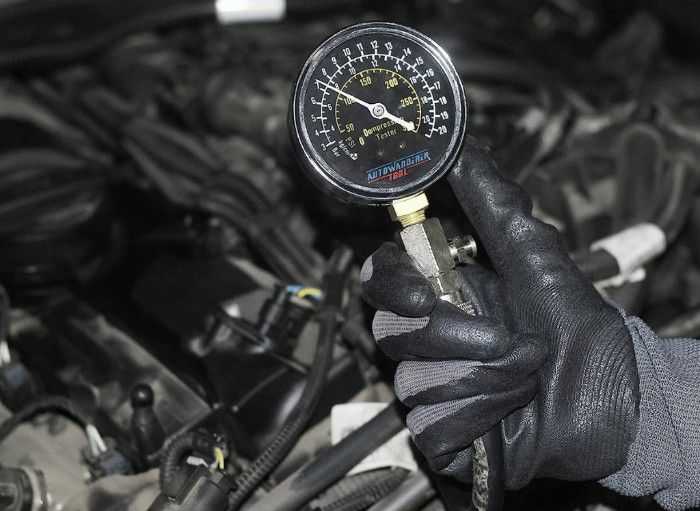
Compression Gauge FAQs
1. What Psi Should I Get on a Compression Test?
A compression test determines how well your engine's cylinders are sealing. By measuring the pressure in each cylinder, you can indicate how much compression is lost due to worn or damaged piston rings, valves, or other components.
The ideal PSI for a compression test will vary depending on the make and model of your vehicle, but a good rule of thumb is around 150 PSI. If any of your cylinders are significantly below this number, you likely have a problem that needs to be addressed.
2. Do You Remove All Spark Plugs for the Compression Test?
When performing a compression test, all the plugs must be removed from the cylinders. If they are not, the test results will not be accurate.
The reason is that the spark plugs provide a path of least resistance for the air/fuel mixture to ignite in the cylinders. Without them, the air/fuel mixture has to compress more to ignite, which creates a higher reading on the compression gauge.
3. Will a Compression Test Tell Me if I Have a Blown Head Gasket?
A compression test is a way of checking the integrity of the engine's cylinders and valves. A mechanic can tell if any leaking is occurring by measuring the pressure the engine can generate.
A blown head gasket is one type of leak that can be detected by a compression test. If the head gasket has failed, pressure will escape from the cylinder into the cooling system or oil passages. As a result, the engine will be unable to build up enough pressure to run correctly.
A compression test is essential for diagnosing engine problems and can help pinpoint the cause of various issues. However, it is essential to remember that a compression test will not always reveal a blown head gasket. In some cases, symptoms of a head gasket failure may not show up until the engine has sustained significant damage.
4. Can You Have Too Much Engine Compression?
In a word, yes. Engine compression results from the piston rising in the cylinder and reaching the top of its stroke. At this point, the pressure in the cylinder is at its highest. If the compression is too high, it can cause knocking and pinging sounds as the air-fuel mixture detonates prematurely. This can lead to engine damage and reduced efficiency.
Additionally, too much compression can make it challenging to start the engine, as there needs to be a certain amount of space in the cylinder for the spark plug to fire correctly. As a result, it is essential to have the right amount of compression to ensure optimal engine performance.
5. What Is Considered Bad Compression?
Low engine compression can have several different causes. In most cases, it results from worn or damaged piston rings. Piston rings are responsible for sealing the combustion chamber, and when they are damaged, they can allow gas and oil to leak into the crankcase.
Other common causes of low engine compression include a defective valve seal or a blown head gasket. Engine compression can also be affected by factors such as the weather, the quality of the gasoline, or the age of the engine. Generally, an engine with low compression will run roughly and may have difficulty starting. If you suspect that your engine has low compression, it is essential to have it checked by a mechanic as soon as possible.
6. How Do You Increase Compression in a Cylinder?
Compression measures how much air or fuel is packed into a cylinder. The higher the compression, the more power an engine can generate. There are several ways to increase compression in a cylinder, including increasing the bore size, increasing the stroke length, and using a high-performance piston.
Increasing the bore size will allow more air or fuel to enter the cylinder, while increasing the stroke length will increase the time the air or fuel has to be compressed. A high-performance piston is designed to provide a tighter seal, which will also help to increase compression. These adjustments make it possible to increase the amount of power an engine can produce significantly.
7. What Are the Symptoms of Low Compression During a Compression Test?
Low compression in an engine can cause several symptoms, including a loss of power, decreased fuel economy, and difficulty starting the engine. In some cases, low compression can also lead to Engine Knock, a knocking or pinging sound that occurs when the air-fuel mixture in the cylinders is detonating prematurely.
Low compression can be caused by several factors, including worn piston rings, damaged valves, or a blown head gasket. Low compression can be resolved by repairing or replacing the affected components. However, low compression can eventually lead to engine failure if left unchecked.
8. What Makes a Car Lose Compression?
Compression is essential for keeping a car engine running smoothly. When pistons move up and down in the cylinders, they create pressure that ignites the fuel and air mixture, resulting in power that turns the wheels.
Over time, however, engines can lose compression due to various factors. One common cause is wear and tear on the piston rings. These rings help to seal in pressure, but they can become damaged or worn down over time, leading to compression loss. Another potential cause is a leaking head gasket.
This gasket helps to keep fluids from leaking between different parts of the engine, but if it is damaged, it can cause compression loss. In some cases, valves may also become bent or stuck, preventing them from sealing properly and leading to compression loss. Ultimately, a car might lose compression for many reasons, but these are some of the most common causes.
9. What Causes Zero Compression in the Cylinder?
When an engine runs, the pistons move up and down inside the cylinders. The up-and-down motion of the pistons is what creates the engine's power. However, the pistons must have enough space to move freely for the engine to work correctly.
If the piston doesn't have enough space, it won't be able to create the necessary power. This can happen if the piston is too close to the cylinder head or if something is blocking the piston's path. When this happens, it's called zero compression. Zero compression can cause several problems, including reduced power and fuel efficiency. In some cases, it can even cause engine failure. A few different things can cause zero compression in the cylinder.
One is a blown head gasket. A blown head gasket can cause the piston to be pushed too close to the cylinder head, resulting in zero compression. Another potential cause is a damaged engine's piston rings. Piston rings are responsible for sealing the piston in the cylinder. If damaged, they can allow oil and gas to escape, pushing the piston out of position and causing zero compression.
In some cases, a faulty valve can also cause zero compression. A faulty valve can prevent the piston from moving up and down correctly, leading to zero compression. Zero compression can be a severe problem for an engine, so diagnosing and fixing it as soon as possible is essential.
10. How to Use Compression Testers for Repair Purposes?
A compression tester is an essential tool for anyone who works on gasoline engines. It is used to measure the amount of pressure that is exerted on the piston when the engine is running.
The compression tester kits include a gauge and hose attached to the spark plug hole. To use the compression tester, start the engine and let it run for a few minutes until it reaches operating temperature. Then, turn off the engine and remove one of the spark plugs.
Next, attach the hose to the spark plug hole and insert the end of the gauge into the other end of the hose. Finally, start the engine again and watch the gauge to see how much pressure is exerted on the piston. If the reading is low, it indicates a problem with the engine.
11. What Compression Tester Kit Works Best for You?
Deciding on the best compression tester for you is a process that depends on what you will be doing with it and how much money you want to spend. The most important thing is choosing one that is easy to use to get an accurate reading. If you are using it for automotive purposes, you will want one that is durable and can withstand high temperatures.
You may also consider one with a large dial to easily read the numbers. On the other hand, if you only use it occasionally, you may not need to spend as much money. In this case, you may choose one that is simple and easy to use. Whichever route you choose, make sure that you select a compression gauge that is right for you.
12. What Are a Lot of Factors to Consider When Trying to Find the Best Compression Testers for Your Needs
Engine compression is one of the most important aspects of engine performance. A high compression ratio can increase power and efficiency, while a low one can cause engine knock and reduced performance. As such, choosing the correct compression tester for your needs is essential.
There are a few things to consider when making your decision. First, engine size is an essential factor. Small engines typically have a lower compression ratio than larger ones, so you'll need a different gauge. Second, you'll need to decide between digital and analog gauges.
Analog gauges are more traditional, but digital gauges are more accurate. Finally, you'll need to decide how much money you will spend. Compression testers can range in price from under $100 to over $1,000. Considering all these factors, you can find the best compression tester.
There are many different brands of compression testers on the market. Still, some popular options include the Innova compression tester, OTC compression tester kit, and Betooll compression tester kit. When choosing a compression tester, be sure to select one that is compatible with the spark plug holes in your engine.
Our Final Thoughts
As we end our article, we hope we have helped you determine the best compression tester brand for your needs. We have taken the time to provide you with information on various brands. We hope you will use this information to find the perfect set.
#CompressionGauge #PressureMeasurement #EngineeringTools #IndustrialMeasurement #QualityControl #PrecisionTesting #MechanicalEngineering #Diagnostics #CalibrationTools #Automation
Thanks for stopping by
Your friend
Todd
Are you looking for the best products? We've got you covered! Our editors independently selected each item on this list. Mechanicaddicts may collect a share of sales or other compensation (at no cost to you) from links found within these pages if they choose to buy something (that's how we stay in business); as an Amazon Associate, we earn from qualifying purchases. Reviews have been edited for length and clarity; enjoy finding your next favorite thing today!


